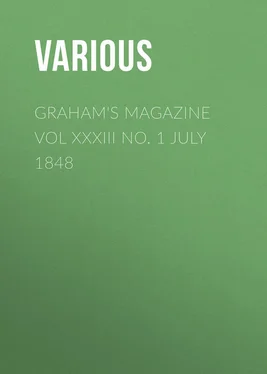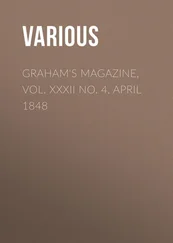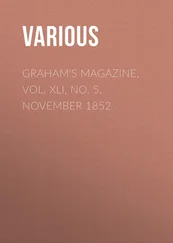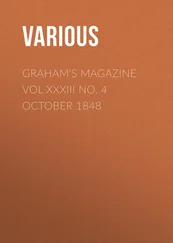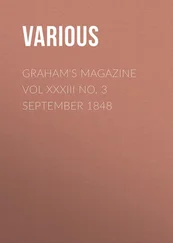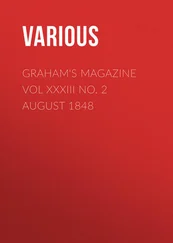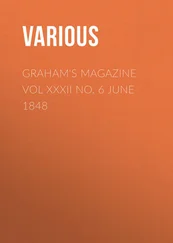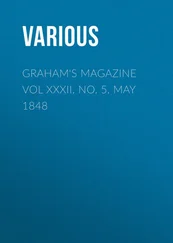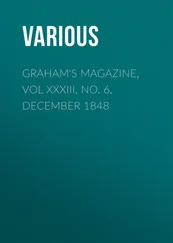Various - Graham's Magazine Vol XXXIII No. 1 July 1848
Здесь есть возможность читать онлайн «Various - Graham's Magazine Vol XXXIII No. 1 July 1848» — ознакомительный отрывок электронной книги совершенно бесплатно, а после прочтения отрывка купить полную версию. В некоторых случаях можно слушать аудио, скачать через торрент в формате fb2 и присутствует краткое содержание. Издательство: Иностранный паблик, Жанр: periodic, literature_19, foreign_edu, на английском языке. Описание произведения, (предисловие) а так же отзывы посетителей доступны на портале библиотеки ЛибКат.
- Название:Graham's Magazine Vol XXXIII No. 1 July 1848
- Автор:
- Издательство:Иностранный паблик
- Жанр:
- Год:неизвестен
- ISBN:нет данных
- Рейтинг книги:4 / 5. Голосов: 1
-
Избранное:Добавить в избранное
- Отзывы:
-
Ваша оценка:
- 80
- 1
- 2
- 3
- 4
- 5
Graham's Magazine Vol XXXIII No. 1 July 1848: краткое содержание, описание и аннотация
Предлагаем к чтению аннотацию, описание, краткое содержание или предисловие (зависит от того, что написал сам автор книги «Graham's Magazine Vol XXXIII No. 1 July 1848»). Если вы не нашли необходимую информацию о книге — напишите в комментариях, мы постараемся отыскать её.
Graham's Magazine Vol XXXIII No. 1 July 1848 — читать онлайн ознакомительный отрывок
Ниже представлен текст книги, разбитый по страницам. Система сохранения места последней прочитанной страницы, позволяет с удобством читать онлайн бесплатно книгу «Graham's Magazine Vol XXXIII No. 1 July 1848», без необходимости каждый раз заново искать на чём Вы остановились. Поставьте закладку, и сможете в любой момент перейти на страницу, на которой закончили чтение.
Интервал:
Закладка:
Immediately in the rear of this car followed another troop of the life-guard, which closed up in the densest and most serried order around and behind the victim of the law, so as to render any attempt at rescue useless.
The person, to secure whose punishment so strong a military force had been produced, and to witness whose execution so vast a multitude was collected, was a tall, noble-looking man of forty or forty-five years, dressed in a rich mourning-habit of the day, but wearing neither hat nor mantle. His dark hair, mixed at intervals with thin lines of silver, was cut short behind, contrary to the usage of the times, and his neck was bare, the collar of his superbly laced shirt being folded broadly back over the cape of his pourpoint.
His face was very pale, and his complexion being naturally of the darkest, the hue of his flesh, from which all the healthful blood had receded, was strangely livid and unnatural in its appearance. Still it did not seem that it was fear which had blanched his cheeks, and stolen all the color from his compressed lip, for his eye was full of a fierce, scornful light, and all his features were set and steady with an expression of the calmest and most iron resolution.
As the fatal vehicle which bore him made its appearance on the esplanade without the gates of the prison, a deep hum of satisfaction ran through the assembled concourse, rising and deepening gradually into a savage howl like that of a hungry tiger.
Then, then blazed out the haughty spirit, the indomitable pride of the French noble! Then shame, and fear, and death itself, which he was looking even now full in the face, were all forgotten, all absorbed in his overwhelming scorn of the people!
The blood rushed in a torrent to his brow, his eye seemed to lighten forth actual fire, as he raised his right hand aloft, loaded although it was with such a mass of iron, as a Greek Athlete might have shunned to lift, and shook it at the clamorous mob, with a glare of scorn and fury that showed how, had he been at liberty, he would have dealt with the revilers of his fallen state.
" Sacré canaille! " he hissed through his hard-set teeth, "back to your gutters and your garbage, or follow, if you can, in silence, and learn, if ye lack not courage to look on, how a man should die."
The reproof told; for, though at the contemptuous tone and fell insult of the first words the clamor of the rabble route waxed wilder, there was so much true dignity in the last sentiment he uttered, and the fate to which he was going was so hideous, that a key was struck in the popular heart, and thenceforth the tone of the spectators was changed altogether.
It was the exultation of the people over the downfall and disgrace of a noble that had found tongue in that savage conclamation – it was the apprehension that his dignity, and the interest of his great name, would win him pardon from the partial justice of the king, that had rendered them pitiless and savage – and now that their own cruel will was about to be gratified, as they beheld how dauntlessly the proud lord went to a death of torture, they were stricken with a sort of secret shame, and followed the dread train in sullen silence.
As the black car rolled onward, the haughty criminal turned his eyes upward, perchance from a sentiment of pride, which rendered it painful to him to meet the gaze, whether pitiful or triumphant, of the Parisian populace, and as he did so, it chanced that his glance fell on the group which I have described, as assembled at the windows of a mansion which he knew well, and in which, in happier days, he had passed gay and pleasant hours. Every eye of that group, with but one exception, was fixed upon himself, as he perceived on the instant; the lady alone having turned her head away, as unable to look upon one in such a strait, whom she had known under circumstances so widely different. There was nothing, however, in the gaze of all these earnest eyes that seemed to embarrass, much less to offend the prisoner. Deep interest, earnestness, perhaps horror, was expressed by one and all; but that horror was not, nor in anywise partook of, the abhorrence which appeared to be the leading sentiment of the populace below.
As he encountered their gaze, therefore, he drew himself up to his full height, and laying his right hand upon his heart bowed low and gracefully to the windows at which his friends of past days were assembled.
The boy turned his eye quickly toward his father as if to note what return he should make to that strange salutation. If it were so, he did not remain in doubt a moment, for that nobleman bowed low and solemnly to his brother peer with a very grave and sad aspect; and even the ecclesiastic inclined his head courteously to the condemned criminal.
The boy perhaps marveled, for a look of bewilderment crossed his ingenuous features; but it passed away in an instant, and following the example of his seniors, he bent his ingenuous brow and sunny locks before the unhappy man, who never was again to interchange a salute with living mortal.
It would seem that the recipient of that last act of courtesy was gratified even beyond the expectation of those who offered it, for a faint flush stole over his livid features, from which the momentary glow of indignation had now entirely faded, and a slight smile played upon his pallid lip, while a tear – the last he should ever shed – twinkled for an instant on his dark lashes. "True," he muttered to himself approvingly – "the nobles are true ever to their order!"
The eyes of the mob likewise had been attracted to the group above, by what had passed, and at first it appeared as if they had taken umbrage at the sympathy showed to the criminal by his equals in rank; for there was manifested a little inclination to break out again into a murmured shout, and some angry words were bandied about, reflecting on the pride and party spirit of the proud lords.
But the inclination was checked instantly, before it had time to render itself audible, by a word which was circulated, no one knew whence or by whom, through the crowded ranks – "Hush! hush! it is the good Lord of St. Renan." And therewith every voice was hushed, so fickle is the fancy of a crowd, although it is very certain that four fifths of those present knew not, nor had ever heard the name of St. Renan, nor had the slightest suspicion what claims he who bore it, had either on their respect or forbearance.
The death-train passed on its way, however, unmolested by any further show of temper on the part of the crowd, and the crowd itself following the progress of the hurdle to the place of execution, was soon out of sight of the windows occupied by the family of the Count de St. Renan.
"Alas! unhappy Kerguelen!" exclaimed the count, with a deep and painful sigh, as the fearful procession was lost to sight in the distance. "He knows not yet half the bitterness of that which he has to undergo."
The boy looked up into his father's face with an inquiring glance, which he answered at once, still in the same subdued and solemn voice which he had used from the first.
"By the arrangement of his hair and dress I can see that he imagines he is to die as a nobleman, by the axe. May Heaven support him when he sees the disgraceful wheel."
"You seem to pity the wretch, Louis," cried the lady, who had not hitherto spoken, nor even looked toward the criminal as he was passing by the windows – "and yet he was assuredly a most atrocious criminal. A cool, deliberate, cold-blooded poisoner! Out upon it! out upon it! The wheel is fifty times too good for him!"
"He was all that you say, Marie," replied her husband gravely; "and yet I do pity him with all my heart, and grieve for him. I knew him well, though we have not met for many years, when we were both young, and there was no braver, nobler, better man within the limits of fair France. I know, too, how he loved that woman, how he trusted that man – and then to be so betrayed! It seems to me but yesterday that he led her to the altar, all tears of happiness, and soft maiden blushes. Poor Kerguelen! He was sorely tried."
Читать дальшеИнтервал:
Закладка:
Похожие книги на «Graham's Magazine Vol XXXIII No. 1 July 1848»
Представляем Вашему вниманию похожие книги на «Graham's Magazine Vol XXXIII No. 1 July 1848» списком для выбора. Мы отобрали схожую по названию и смыслу литературу в надежде предоставить читателям больше вариантов отыскать новые, интересные, ещё непрочитанные произведения.
Обсуждение, отзывы о книге «Graham's Magazine Vol XXXIII No. 1 July 1848» и просто собственные мнения читателей. Оставьте ваши комментарии, напишите, что Вы думаете о произведении, его смысле или главных героях. Укажите что конкретно понравилось, а что нет, и почему Вы так считаете.
